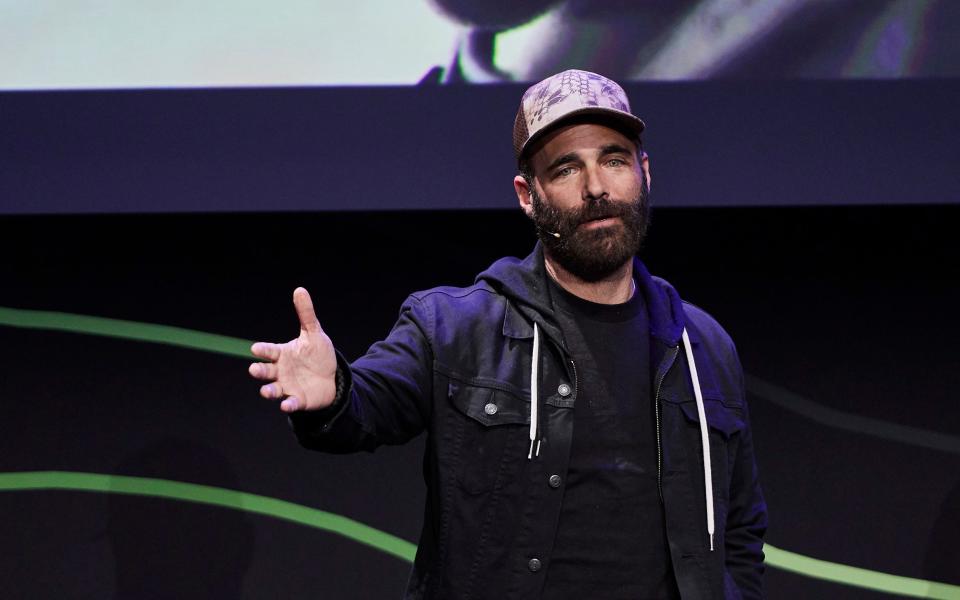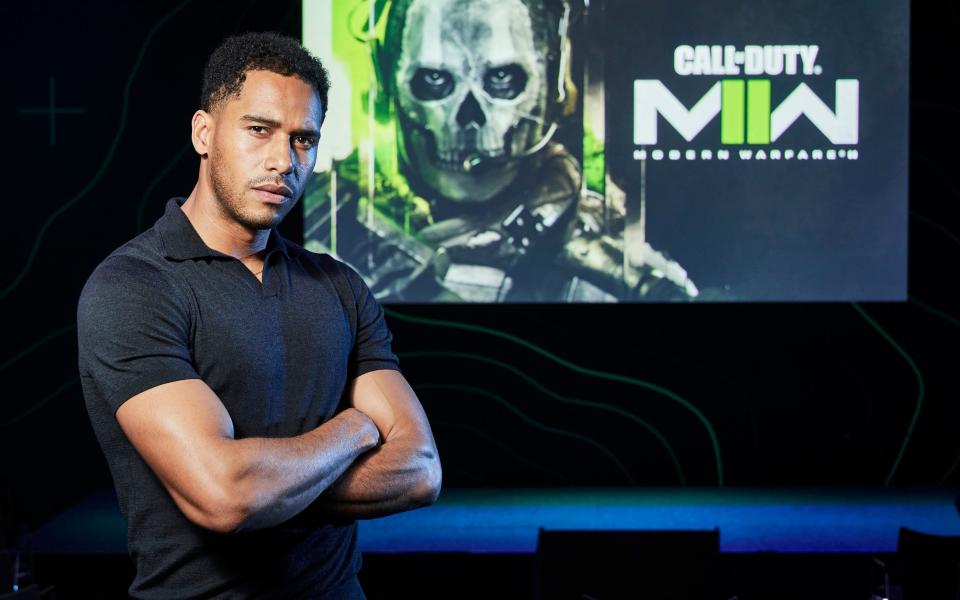Representation and global warfare: how real-world issues shaped the new Call of Duty campaign

“Ooh, a chicken and egg question!” cackles Brian Bloom, a likeable and loquacious New Yorker with a string of film, TV, and videogame credits on both sides of the screen that stretch all the way back to a bit part in Sergio Leone’s 1983 classic Once Upon a Time In America.
He’s currently holed up in a former stock exchange in Amsterdam on a press junket for the latest Call of Duty instalment, Modern Warfare II, on which he served as lead writer. The new game is a direct sequel to 2019’s reboot, Modern Warfare, rather than a remake of the 2009 sequel of the almost exact same name, Modern Warfare 2, which was itself a follow-on from the original Call of Duty 4: Modern Warfare (pay attention at the back).
We'll get to the question in question in a moment. Bloom and his equally expressive colleague Jeff Negus, the game’s Narrative Director, had just spent the best part of an hour on stage explaining what they set out to do with their game, a theme they picked up again in the first few minutes of our subsequent interview.
Modern Warfare II picks up exactly three years on from the final frame of its predecessor – “it starts when you put the proverbial disc in… although you’re not putting a disc in anymore”, says Bloom – with returning characters, SAS Captain John Price and Sergeant Kyle ‘Gaz’ Garrick – having spent the intervening time recruiting their new Task Force 141.

This opens the door for the return of cult characters from the original series, John ‘Soap’ MacTavish and Simon ‘Ghost’ Riley. But it also provided a challenge for the narrative duo in bringing things up to date.
“We had opened up some cans of worms purposefully,” says Bloom of 2019’s climactic cutscene ,which teased the reintroduction of Ghost, “and not pejorative cans of worms – they were exciting! You wanted to see what the hell's in that can!
“Now the team is three years later, so what's the team been doing? How can we put as much of the story on camera so that it's not like, well, a whole canon of three years that you need to know to make this work, has happened?”
Bloom cites the changes in Price and Gaz’s in-game abilities and on-screen portrayals as an example of how they tried to convey three years’ worth of character development without resorting to extended use of exposition or flashbacks.
“There's a bit of a hand wave through the three years where we're talking about, hey, they were prosecuting targets and Price and Gaz were getting closer and closer and better and better and becoming, a well-honed, well-oiled fire team. But now delivering on that, well, what does that look like? If you watch Price and Gaz in a 2019 scene and if you watch them in scenes in missions in ‘22, is there a noticeable clear value change?
“We're thinking in arcs, we're thinking in timelines, we're thinking in continuums, and we're thinking in delivering the promise of a premise that there is a Task Force 141, what does that mean? Who are they? Why do we need them? What would they be here for?”
“And in that way, we knew that it had to be much bigger,” adds Negus.”It had to have a bigger cast, it had to go to more places, it had to dig deeper into certain things.”
Modern Warfare II’s campaign is bigger, alright – a globe-trotting thrill-ride that impressively combines some of the series’ most spectacular set pieces to date with smaller, more character-driven missions that owe as much to the scavenging survivalism of The Last of Us and open-ended assassination in Hitman as your typical serving of CoD. So which does come first: storyline or gameplay?
“Chicken and egg is the perfect analogy here,” says Negus, picking up his colleague’s earlier thread, “because one's never first and one's never second.
“The mechanics themselves don't mean anything without some context. They don't mean anything without characters that have a perspective on the actions they're taking. And vice versa. The narrative doesn't have a venue, doesn't have a way to express itself without the mechanics to do so.”
“It's a little bit like ingredients and dishes,” says Bloom, warming to his theme. “But that ingredient might be a narrative ingredient, it might be a character, it might be a place, it might be a setting somebody was interested in, it might be a mechanic, it might be a feature, it might be a system that somebody is working on.
“It's not unlike how bands might work – it's just a f***ing big band…”

The original Modern Warfare trilogy’s plot centred on Russian ultranationalists attempting to start a nuclear conflict with the United States – indeed the original Modern Warfare 2 featured the infamous ‘No Russian’ level, in which the player took part in a graphic terrorist attack on an airport. The new game’s antagonists are an unlikely alliance of Islamic terrorists and Mexican drug cartels, although there are certainly hints the Russians might return in a future sequel. Given the current conflict in Ukraine, how much does geopolitics affect where they can take the narrative?
“We don't want to play fast and loose with anybody's culture,” says Bloom, his tone several notches more serious now. “We don't want to play fast and loose with anybody's war, on either side of any of them. We don't want to do commentary on any of those things. We don't want to step into someone's war, we don't want to step on someone's war.
“We had to pull out a crystal ball early in this process when we started three years ago. And we think less in terms of, ‘war is our game’. Whether you might see this on your own or not, it's not really about war. It's about warfare. It's about small teams. On the Modern Warfare side, it's about [Task Force] 141 and other Special Operations teams prosecuting targets to prevent war in many cases.”
Back in 2017 Modern Warfare II developers Infinity Ward founded a major new studio in Krakow, Poland, and Bloom references his colleagues there when he says “we have people who are literally involved [in the Ukrainian conflict]”.
“We absolutely put our players in provocative positions,” he reasons, “but we give them a chance to feel empowered and to resolve conflict, to cut the heads off snakes, to go after the bad guys, to use the mechanics, systems and features of the game – sometimes they're as big as an AC 130 gunship, and sometimes they're a small sub fan blade, literally in this game – to survive, and to prevent awful things from happening.”
Both Bloom and Negus are quick to acknowledge the contributions of their acting talent, “the carbon based life forms”, as the writer refers to them on more than one occasion, who bring their scripted reality to life via the magic of motion and performance capture.
The Telegraph sat down with two, veteran American character actor Glenn Morshower, perhaps best known for his seven-season run as secret service agent Aaron Pierce in real-time cop drama 24, and Elliot Knight, the Birmingham-born performer who plays Kyle ‘Gaz’ Garrick.


Morshower first lent his immediately recognisable likeness to a videogame in 2006, voicing his character in the eminently forgettable PlayStation title 24: The Game – “It was one step beyond Pong, frankly!” he recalls when asked to compare that experience with Modern Warfare 2’s – and has dabbled in others since. Interestingly for an actor of his age, he approaches videogame roles as he would a more traditional one.
“To me, they're strikingly similar because character is character, people are people and truth is truth,” he explains in a commanding Texan boom. “The difference is the way we dress – which is that we don't! I mean, we have basically a leotard, and a bunch of interesting small little white balls all over our body, and a helmet with a camera. And we don't have the world in front of us. Everything is pretend.”
Morshower recalls with an endearing sense of wonder a scene he shot on a featureless motion capture stage in which his character, General Shepherd, turns away from another during a conversation, only for the animators to paint in a window – and his reflection – in post production.
“We smile because we are seeing them for the first time when the player sees them for the first time, because there was no window, and there was no reflection. And then they made that turning away so beautiful in the playback. And that's quite a bit different than it is in the cinematic world.”
Knight grew up playing the Call of Duty games with his dad, and is rather more versed in the genre’s conventions – good and bad. As a man of mixed British-Jamaican heritage, he wrote an impassioned open letter to the videogames industry in the summer of 2020 promoting the power of representation and the Black Lives Matter message.
“Look, it's not the only industry that has,” he replies when I ask if the videogame industry still has a representation problem. “It's a journey, right? There's no end point when it's done. And I'm glad to see that the gaming industry as one is on that journey.

“This title is probably the biggest in the world when it comes to the gaming industry. It’s played in so many countries by so many different people from different cultures and of all ages, of all different identities. It's such a spectrum. And it was exciting for me, for the Modern Warfare part of the franchise, to see a reboot and rebirth of that, that allowed so many of those players more accessibility of imagination into the characters that they’re playing.
“I think it's difficult to understand and also to underestimate the power that a choice as simple as this can have on millions of people. I can only imagine it's very comfortable and safe to grow up in a world where you see reflections of yourself everywhere, being celebrated, and being a hero. And frankly, like Call of Duty has done for quite a narrow identity, for years.
“And this is something I've talked about with people at [Call of Duty publishers] Activision. They've been very gracious letting me bring that conversation to them and having it with me and listening. Just to point out, it will always mean the world to me, and to millions of people, just to have someone with black skin or brown skin be a hero, and treat them as such.
“It's an easy choice to make. It's a simple choice. It doesn't require any more money and effort. But it has such a huge impact.”
“It's a responsibility also for you to live up to,” adds Morshower in a tone bordering on the paternal. “There's a saying in life that to whom much is given, much is expected. And you have been given an opportunity, just as I have, we all have. It's quite lovely, actually.”
By way of introduction to Modern Warfare II earlier that morning, Brian Bloom proclaimed, “every great story has a theme and ours is no exception. Our theme is, you are the company you keep”. In this regard at least, he’s keeping very fine company indeed.
Call of Duty Modern Warfare II is released on PlayStation, Xbox, and PC on October 28, 2022

